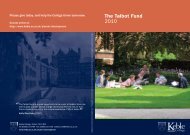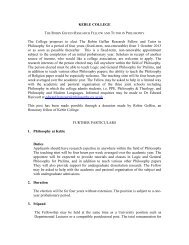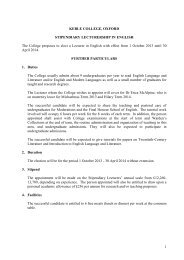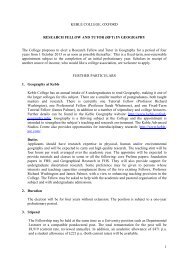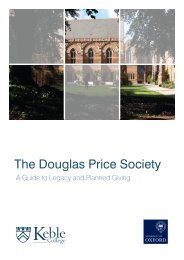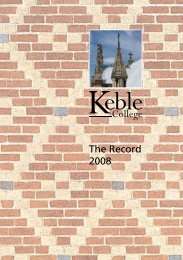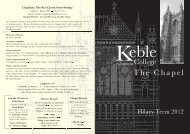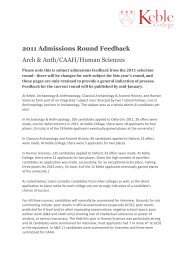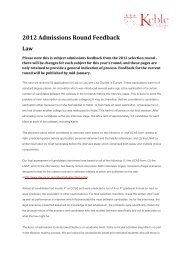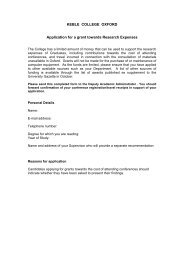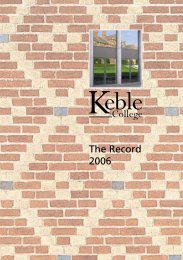The Record 2009 - Keble College - University of Oxford
The Record 2009 - Keble College - University of Oxford
The Record 2009 - Keble College - University of Oxford
You also want an ePaper? Increase the reach of your titles
YUMPU automatically turns print PDFs into web optimized ePapers that Google loves.
<strong>The</strong> Life <strong>of</strong> the <strong>College</strong><br />
and processes. Such an approach is likely to be essential in<br />
exploring immunity and certain other biological problems such<br />
as ageing. Gerontology is another area <strong>of</strong> active research on C.<br />
elegans, because the worm lives normally for only two weeks<br />
and consequently it is easy to detect and study changes in the<br />
process <strong>of</strong> ageing. With the right kind <strong>of</strong> genetic manipulation,<br />
its lifespan can be extended to six months, and the Methuselah<br />
worms remain in apparently excellent health, even in extreme<br />
old age (for a worm). One factor contributing to such an<br />
extension <strong>of</strong> healthy lifespan turns out to be the increased<br />
activity <strong>of</strong> immune defences, although it is clear that this is<br />
far from the whole story. Whether insights gained using C.<br />
elegans will ultimately allow humans to live for several centuries<br />
remains to be seen.<br />
‘Mission (im)possible?’— Rehabilitating Plutarch as a<br />
historian <strong>of</strong> philosophy<br />
Eleni Kechagia, British<br />
Academy Research Fellow<br />
How can we know what the ancient Greek philosophers said?<br />
<strong>The</strong> answer to this question seems fairly obvious: we read<br />
their works! But what happens in those cases (and there are<br />
quite a lot <strong>of</strong> them) where the ancient philosophers’ works are<br />
irretrievably lost? Three options present themselves here:<br />
We hope that the archaeologists will sooner or later unearth<br />
precious papyri rolls that contain fragments <strong>of</strong> the ancient<br />
Greek philosophers’ lost books. This is not an Indiana-Joneslike,<br />
thoroughly unlikely scenario — in the 18 th century an<br />
excavation in Ercolano near Naples brought to light a great<br />
number <strong>of</strong> carbonized papyri rolls which gave us invaluable<br />
fragments from an important work <strong>of</strong> Epicurus, thus<br />
substantially improving our knowledge <strong>of</strong> Epicurus’ theories.<br />
<strong>The</strong> downside <strong>of</strong> this scenario, however, is that we may have<br />
to wait quite a while before such a remarkable revelation takes<br />
place once again.<br />
We give up hope and settle with the idea that, quite simply, we<br />
cannot find out what the ancient Greek philosophers, whose<br />
works are now lost, said. Reasonable and down-to-earth though<br />
this may sound, it is clearly not an option for a classicist and a<br />
historian <strong>of</strong> ancient philosophy such as myself.<br />
We dive into the surviving books <strong>of</strong> other ancient Greek (or<br />
Roman) authors, for example Plutarch (1 st –2 nd century ad), who<br />
discussed, though not always very systematically or charitably,<br />
the views and sayings <strong>of</strong> philosophers <strong>of</strong> their past. With a great<br />
deal <strong>of</strong> philosophical imagination and patience, and with a good<br />
17




